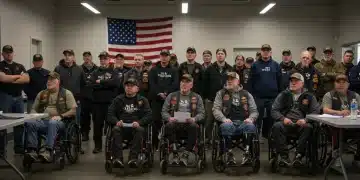Emergency utility assistance for seniors: what you need to know

Emergency utility assistance for seniors provides crucial support for low-income seniors to help them pay their utility bills, ensuring they maintain essential services during financial hardship.
Emergency utility assistance for seniors is a vital resource that can make a significant difference in difficult times. Have you ever wondered how seniors can get help with utility bills when unexpected challenges arise? Let’s dive into this important topic.
Understanding emergency utility assistance programs
Understanding emergency utility assistance programs is crucial for seniors facing financial hardships. These programs are designed to help individuals meet their essential utility needs during difficult times.
What Are Emergency Utility Assistance Programs?
These programs provide financial aid to help low-income seniors pay their utility bills. They can cover expenses such as electricity, heating, and water, ensuring that seniors maintain access to these vital services.
How Do These Programs Work?
Generally, utility assistance programs operate through government agencies or non-profit organizations. Here’s how they typically function:
- Eligibility is determined by income level and household size.
- Applicants usually need to provide proof of income and residency.
- Once approved, the funds can go directly to the utility provider.
Many programs also offer additional resources, such as energy-efficient upgrades or counseling services. These resources help seniors reduce their overall utility costs and improve their living conditions.
Who Is Eligible?
Eligibility requirements may vary by program, but they generally cater to low-income individuals, including seniors. Some common criteria include:
- Age (usually 60 years or older)
- Low income, typically below a certain percentage of the federal poverty level
- Proof of need, often requiring documentation of recent bills or financial hardship
Understanding these criteria can help seniors navigate the application process more effectively.
Application processes can vary significantly across states and organizations. Many applications can be completed online, streamlining access for those in need. It’s vital for seniors to act quickly, especially during peak seasons when utility bills may escalate.
Involving family members or trusted friends in the application process can also be beneficial. This support can provide seniors with the assistance they need to fill out necessary forms and submit required documentation.
Eligibility criteria for seniors

Eligibility criteria for seniors seeking emergency utility assistance are vital to understand. These criteria help determine who can receive support and ensure that those in need get assistance. Several factors are examined during the eligibility process.
Income Level
One of the primary criteria for eligibility is income level. Seniors typically must have a total household income that falls below a specific threshold. This threshold varies by program and region, but it often aligns with the federal poverty level.
Age Requirement
Most programs focus on seniors aged 60 years and older. This age requirement acknowledges that older adults may face unique challenges, including fixed incomes and increased utility demands.
Residency
To qualify for assistance, seniors usually must provide proof of residency in the area where they are applying for help. This requirement ensures that aid is directed to those within specific communities who truly need it.
Proof of Need
Applicants must often demonstrate a need for assistance. This may involve submitting recent utility bills or proof of financial difficulty. Many programs require documentation to confirm that the applicant has experienced a recent financial hardship.
In some cases, programs may also consider additional factors, such as medical expenses or housing costs, when assessing eligibility. Understanding these criteria can simplify the application process.
Working with local agencies or non-profits can also provide guidance and support. They can help seniors gather necessary documents, complete applications, and understand available resources. An extra helping hand can make a significant difference in navigating the process.
How to apply for assistance
Understanding how to apply for emergency utility assistance can be straightforward if you follow a few essential steps. This process helps ensure that seniors in need can get the support they require without unnecessary complications.
Gather Necessary Documents
Before starting the application, it’s important to gather all required documents. Commonly needed items include:
- Identification proof, such as a driver’s license or ID card.
- Proof of income, like pay stubs or Social Security statements.
- Recent utility bills to demonstrate need.
- Documentation of any financial hardships faced.
Having these documents ready can streamline the application process and help prevent delays.
Find Local Assistance Programs
Next, search for local programs that offer utility assistance for seniors. Various organizations, including governmental agencies and non-profits, provide such support. Websites or local community centers can be valuable resources. Contacting these organizations directly may also yield faster results.
Complete the Application
Once you’ve identified a program, obtain the application form. This may be available online or in person at local offices. Fill out the application carefully, ensuring that all required information is provided. Be honest about your circumstances to increase your chances of approval.
Don’t hesitate to ask for help if needed. Family members or friends can assist in filling out the application, especially if seniors face challenges with technology or written forms.
Follow Up on Your Application
After submitting your application, it’s crucial to follow up. Contact the organization to check on the status. This can help address any issues promptly and ensure that your application is processed in a timely manner. Regular communication can also keep you informed about any additional steps required.
Being proactive can significantly enhance the chances of receiving the needed aid. The support from utility assistance programs can provide relief to seniors and help them manage their expenses.
Resources and organizations to help seniors

Finding the right resources and organizations to help seniors with emergency utility assistance can greatly enhance their chances of receiving help. Various local and national programs exist to support older adults in need of utility aid.
Local Non-Profit Organizations
Many local non-profits focus on assisting seniors with utility bills. These organizations often provide compassionate services and personalized help. Here are some types of organizations to consider:
- Local food banks that may offer utility assistance as part of their services.
- Senior centers that provide information about available utility aid.
- Community action agencies aimed at reducing poverty and supporting low-income families.
Reaching out to these organizations can connect seniors to resources and receive guidance tailored to their situation.
Government Assistance Programs
Several government programs are specifically designed to help seniors facing financial difficulties. Look into programs such as:
- Low-Income Home Energy Assistance Program (LIHEAP) which helps eligible families with their heating and cooling costs.
- Supplemental Nutrition Assistance Program (SNAP) which can provide additional funds that may alleviate pressure on utility bills.
- State and local energy assistance programs that offer direct support to help manage energy costs.
Each program has specific eligibility requirements, making it vital for seniors to research options that best fit their needs.
Online Resources
With advancements in technology, many organizations now offer online resources. These tools can help seniors find information about available assistance. Websites like Benefits.gov allow users to check eligibility for various programs quickly. Many local non-profits also maintain websites with details about the services they offer, making it simpler for seniors to get the help they need.
Connecting with peers through online forums or social media groups can also provide valuable advice and local resources. Seniors can share experiences and recommendations for navigating utility assistance, creating a network of support.
Finding the right resources requires some effort, but it can lead to crucial assistance for seniors facing utility challenges. A supportive community and access to the right programs can make a significant difference in their lives.
In conclusion, understanding and accessing emergency utility assistance is essential for seniors facing financial challenges. By knowing eligibility criteria, gathering necessary documents, and reaching out to local organizations, seniors can find the support they need to keep their utilities running. With a little effort, resources can be discovered that help ease financial burdens. Community support and available programs play a crucial role in ensuring that seniors maintain their quality of life during tough times.
FAQ – Frequently Asked Questions about Emergency Utility Assistance for Seniors
What is emergency utility assistance?
Emergency utility assistance helps low-income seniors pay their utility bills, ensuring they have access to essential services.
Who is eligible for utility assistance?
Eligibility typically includes seniors aged 60 and over, with income levels below a certain threshold, along with proof of residency.
How can I apply for assistance?
Seniors can apply by gathering necessary documents, finding local assistance programs, and completing the application process either online or in person.
What resources are available for seniors?
Many local non-profits, government programs, and online platforms provide information and support to help seniors find utility assistance.





